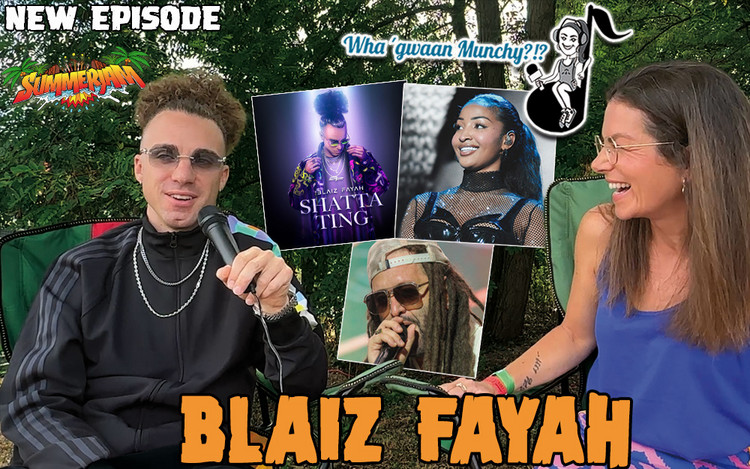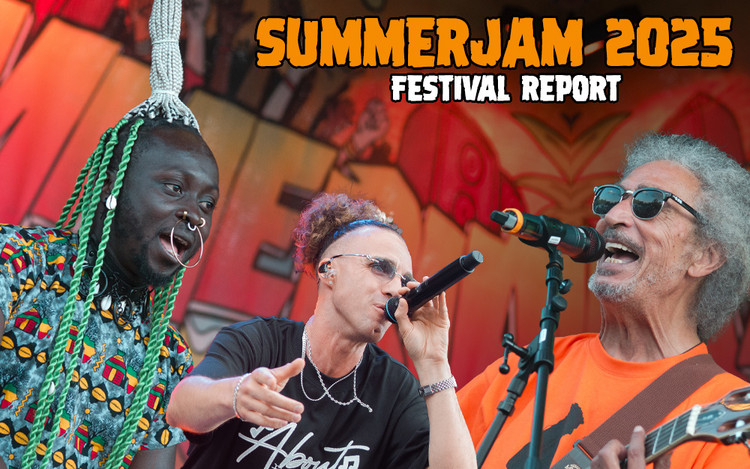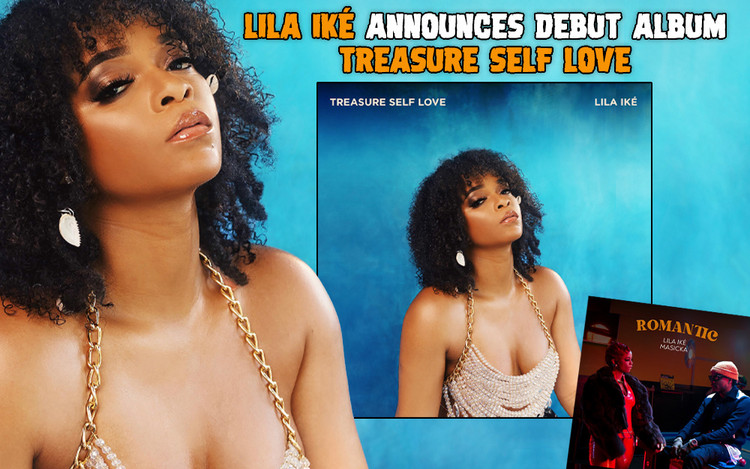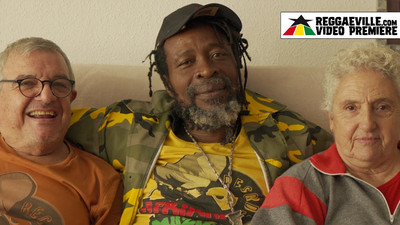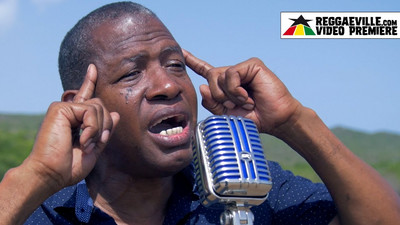Lt. Stitchie ADD
Lt. Stitchie Interview - Major Label Success, Return to Dancehall, Christianity & New Album
04/28/2019 by Angus Taylor
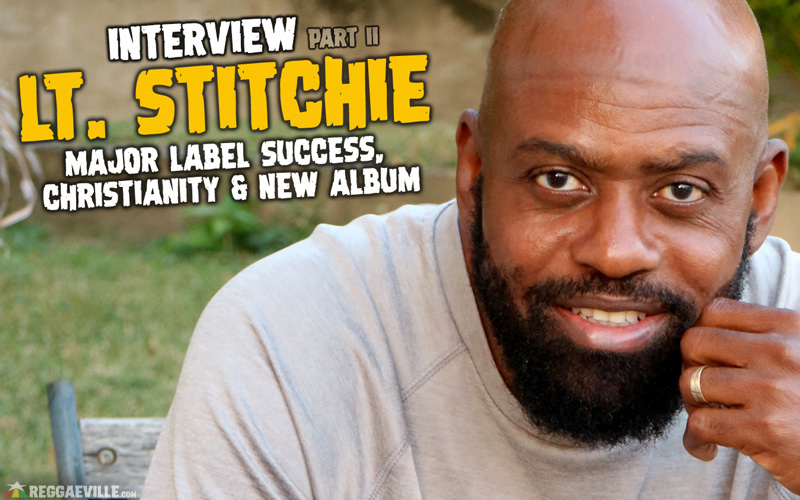
In Part 2 of our interview with Lt. Stitchie, he talks about international major label success, returning to the dancehall in the 90s, his conversion to Christianity and his new album Masterclass…
You recorded your first album for Jammys in 1987.
Wear Yuh Size for Jammys. It was called Wear Yuh Size in Jamaica but also named Great Ambition by Jammys for overseas. I don't know the wisdom in that, I'm still young in the business (laughs) but that's how Jammys decided to get it done.
How did you first decide to start using different voices for different characters in the same tune?
Because of the same story Dulcimina [JBC radio serial on air 1967-1980]. The same story on the radio where I got the name Ranking Noseworthy. Noseworthy was a character. This is a story where one person had several different voices. I was, as I told you, a very humorous person so I expressed myself in various different tones, in various different ways and it worked. My mother was a lady who was full of humour and she would tell us different jokes, as youths growing up. She would use different voices to express things that happened and I learnt that as well too.
I was very impressed by how we used to listen on the radio. You used to have Miss Lou and Ranny [JBC’s Lou & Ranny Show, 1959-1964]. And we used to listen to that thing like a movie. We never had television. Radio was powerful and that was a part of the influence as well. That's how I used voices that way to express myself in the dancehall business and in the deejay thing. I still do it to this day.
Tell me about how you came to the attention of Atlantic Records.
Well, Stereo One was what we call a rub-a-dub sound and Stone Love was what we call a soul sound. Everywhere that we would go Wee Pow [Winston "Wee Pow" Powell] is a person who rated and respected me then and now. Right across the board. And so anywhere Stereo One was playing we would go along with Stone Love, as the soul sound and the rub-a-dub sound to a lot of places. And so the visibility of Stone Love grew.
Wee Pow asked me if I could deejay a song for him on a rhythm like a special, a dubplate for his sound. They never had any deejay - they don't use deejays. So when I did it for him it stood out and they used to play at the HQ on Torrington Lane on a Thursday night. And I gave him the dub. I recorded it around by Jammys - Old Time Teaching. It's a style of lyrics that I have where I write lyrics so much that even when the rhythm finishes I still deejay without the rhythm a capella. Because the lyrics are long and I have a very excellent memory thanks be to The King.
And so I did the song for him, Old Time Teaching, and when the rhythm on the dubplate was finished I was still deejaying. He took it that night and went to the dance and played it. The place mashed up because they never heard something like that before. It was brand new because we always thought of creative ways to present the thing than to be locked into any one wall. That has never been me. So he started playing the music in the dance and the place went wild and the place started to mash up and the people started to get excited.
Now in that dance they were all different kinds of people, foreigners and locals. There were two men - one local but who travels overseas and one who lives overseas. The local guy was Dave Rodney who used to work with Jamaica Tourist Board and his friend who was visiting with him at the time was a guy called Timmy Regisford. I thought it was Merlin Bobb but it was actually Timmy Regisford. Timmy Regisford was an A&R person of a major record company in the States. Now they have a connection with Merlin Bobb because he is a part of that group of friends: Dave Rodney, Merlin Bobb and Timmy Regisford. Somebody had spoken to me before and I believe I said Merlin Bobb, but it was actually Timmy Regisford who was there.
And they were blown away by the thing and they were asking where can they get this record to purchase. Somebody told them “No, it's a dubplate” and they asked “What is a dubplate?” They didn't understand what is a dubplate, what is a special! Nobody could explain to them so Dave came to me. He went to several different deejays and they couldn't articulate it and somebody said to him “Ask Stitchie, he is a youth who knows how to express himself”.
He came to my house and he asked me “What is a dubplate?” I told him “It is a record that is not available at the record store for sale. It is done for specifically for this sound that plays it. That is why it is called a special. And this is called underground music. It's not a music that is available to the general public. You will only hear this specifically played by particular sounds”.
And he was amazed with the explanation and they were amazed with the dubplate too. They said “Listen, this guy is excellent we need to get something done seriously for him”. And so they went back to the States and they met up with Merlin Bobb. Merlin Bobb was one of the VP for Atlantic Records and Sylvia Rhone was the president. So I got signed because of that dubplate and it bust Stone Love big too! To this day Stone Love is still growing, so that's part of my legacy.
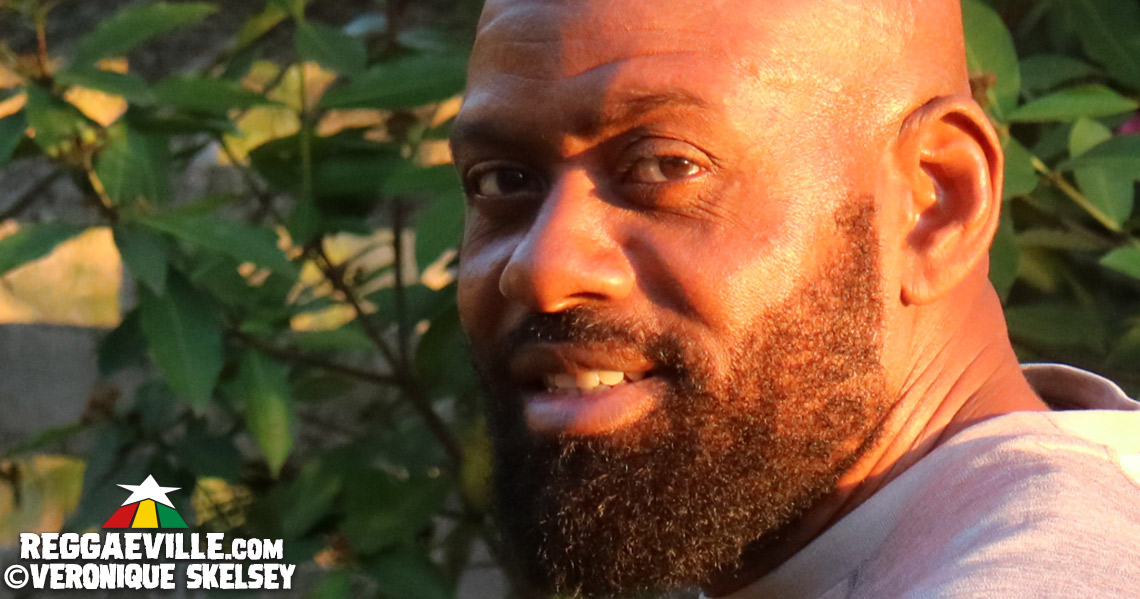
You released a series of albums for Atlantic. You worked with some of the biggest rappers like LL Cool J and Big Daddy Kane, you performed with some of the biggest soul singers like Teddy Pendergrass and Luther Vandross, but you've said in previous interviews you didn't feel they fully knew how to amplify your potential.
Yes. And that is what caused me to part company with them in ’93. Because I sold gold with LL Cool J 14 Shots To The Dome and the song I did on it was Straight From Queens. I was also the first dancehall artist to hit the Billboard Charts with Dress To Impress. So the achievement was great in a lot of ways. But I still felt that my potential was not being fully maximized. They never understood how to market reggae and I was basically the guinea pig for so many other artists that came after.
All the albums went to number one, they sold excellently, they got me several different number ones from each album. I did three albums for them. The first one was The Governor, then we did Wild Jamaican Romances and then we did Rude Boy. I won several different Album Of The Year awards for all three albums. They were massively successful but still my potential wasn't being met. I did a song like Night And Day and that was the first dancehall song with the video being recorded on film, not on VHS. And yet still I never saw it on MTV, I never saw it on BET. I thought it was fitting because of the quality and the production of it and it was a hit right across the board.
So I never thought that they exploited that opportunity and brought me that platform. It's not that we never had the music to do it. I was really frustrated. I wasn't feeling pleased that I wasn't getting that kind of a support and that kind of push behind the thing to get it where it needed to go. Because at the same time I'm performing with everybody else, selling gold with these artists. I'm hitting the Billboard Charts with products from the albums that they are the owners of and yet still this is not happening.
So in ’93, just after we sold gold I decided “Listen, I'm just going to move back my whole thinking to my roots, to my dancehall audience”. I've never left home. I've always been in the dancehall. So I just made that move. The first song I recorded after making that move was Bun It Down with Patrick Roberts and Shocking Vibes. That went to number one and then pure number ones after that. In one calendar year I ended up with 14 number one songs.
What's so interesting is that some artists who had that taste of international mainstream success would have just kept trying to chase that in different ways and water down what they were trying to do to maintain that success. And you went back to the scene you came from and your style still felt totally contemporary.
Yes. Because that's who I am. If you leave your roots you’re bound to wither. And I've never left my root. I've never forgotten who I am. I'm quite comfortable in my skin. I am not an impresario. I don't think that I need to try and impress you. I'm quite comfortable with who I am. There's just one Lieutenant Stitchie, the governor. I'm a prototype because God made me so and I say this with humility, not being ostentatious in any way. Just simply speaking the truth acknowledging who I am and how comfortable I am being me.
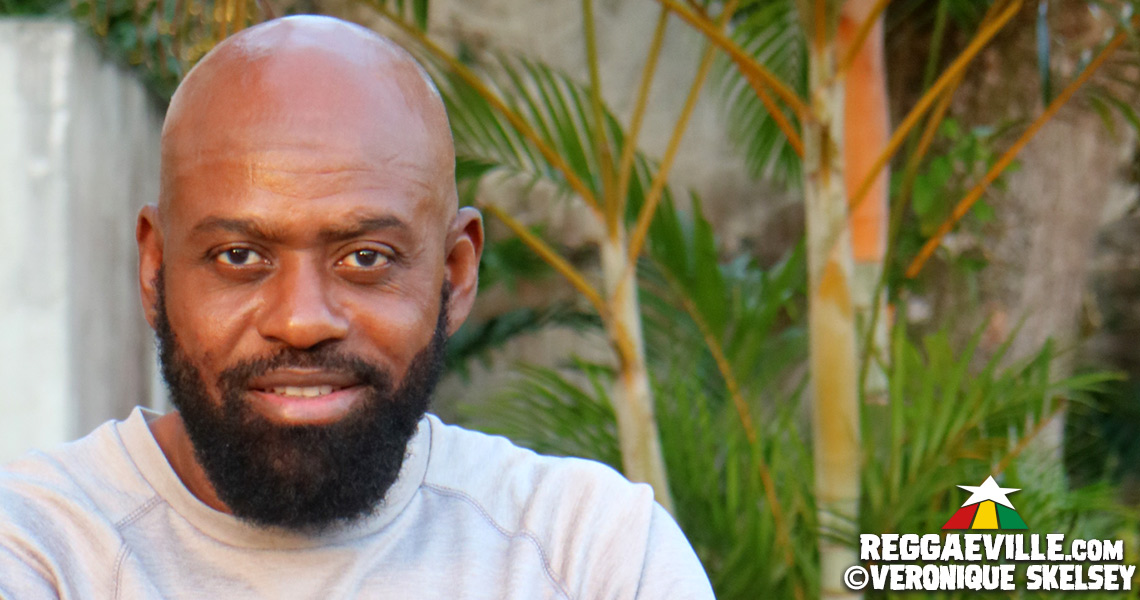
“The truth” is a very interesting point to move on from to my next topic. Because having made a very successful comeback in Jamaica you then took a spiritual journey.
I've always been very conscious of who I am as a person and the appreciation of the Giver Of Life and the borrowed oxygen that I enjoy. So this put me in a position to walk on a platform of humility. Because we are here today and gone tomorrow, if so long. So each moment that I get to share with anyone, I cherish it and treat it with the utmost respect. Because it very well might be the last. That's the kind of approach I take even on stage. When I go on stage I give my all as if this is the last one.
So walking on that kind of platform brought me to a whole different level I think. I started taking an introspective view of my life. My report card at one point wasn't looking so good because my mother and I were best of friends and then she went home to be with The Lord in February of 1995 and it was very devastating for me. At the funeral service, the thanksgiving service, the pastor was preaching and he said “If you planted corn it will germinate and it will grow” and “If you planted peas, peas will germinate and grow”. But you know from earlier on in the interview that science is very much a big thing in my life. I understood exactly what he meant by germination to mean a whole different thing rather than just a word being metaphorically used in a statement. I know that the depth of germination means that something has to die and bury for newness of life to come.
So I took an introspective view Angus, and I said “Stitchie what is it that is in you that you need to bury so that newness of life needs to come?” And I started looking at myself and realising that it was the lifestyle. I wasn't doing anything derogatory or anything bad. I wasn't a criminal or a gangster in any way but I started noticing that “Look here, maybe the gift that you get in music you weren't using it effectively as you could”. It was more along a line of human social commentaries and that kind of stuff. Rather than things to cause people to confront themselves and look at their lives and see what they could do to make themselves better - rather than having to be told by anyone who or what you should do or who or what you should be. Because people always know how to live your life for you but don't even know how to live theirs!
So I started looking at my life and saying “Yeah I'm a big popular star, king of the dancehall and that kind of stuff. But all the fame and everything that comes with that, at the end of the day, what are you going to benefit from that? What does the report card look like when you meet your Creator? What will you say you have done with the talent that you have been given?” And it wasn't looking so good for me so I decided “Listen now I have to do something about this”. And it was right there at the funeral service, my mother's thanksgiving service that I started looking at things in these lights.
And then shortly thereafter I couldn't do any more recording. I was devastated by her loss, so I couldn't do any more recording. Just after getting Deejay Of The Year as well. So I said “Alright let me let it be”. I remember one song I wrote with Buju. Buju invited me and said “Governor, let's write a song together” and we did the song called Suffering and then I recorded it for his label Cell Block at the time. Then I recorded another song called the Raw Truth “the truth is an offence but it's not sin, hear the drum, listen the riddim, hear the African voice calling. hear the drum, listen the riddim”. I did songs more along the line of thinking. And then I just ceased from doing stuff. Just trying to find my whole walk spiritually myself.
Then I was called by the organizers of Reggae Sumfest and they wanted me to be one of the headliners for the festival. I wasn't keen on taking up the task but they said that they needed me to be a part of it, Deejay of the Year and that kind of stuff. So I accepted the deal and started preparing myself, started writing some lyrics for the night. I was on my way going down, practising what I was going to deliver for the night, in my car, me and my friends. About five of us, one in the passenger seat and three in the back. I was the driver. I was reaching the border of Trelawny and St. James when a truck driver coming in the opposite direction just rammed straight into my vehicle. Even though I was honking on the horn and he just ran straight into us and hit us into a utility pole.
And it was totally written off, blood was coming from all over and everybody thought that we had died. Because the hit was so major that people thought that those people must be dead. I was seeing double. I never had on my seat belt which in this case was a good thing for me because if I had it on I would have been trapped in the seat and the back of the seat went straight into the steering wheel. I would have been pinned there and it would have gone straight to my chest. But I saw it coming and moved away from it and here we are today doing this interview. Had it not been for that we wouldn't be here.
So I went to the hospital and against the doctor's order I went to the festival nevertheless. I got seven encores. The best performer for the night. The best performer for the festival. The people were still screaming for more. I was there getting interviewed by several different journalists from all over the world. And I remember one guy was a white guy with locks. I found out later his name was Jah Pickney and he gave me a little book, a gift. He was complimenting me on my performance and I learnt later that he was coming to Jamaica for the first time. He's from Belleville, Canada and he was 15 years old at the time and that was in 1997. He gave me the little book and I placed it in my pocket because I was doing an interview with Winford Williams.
When I went back to the hotel room I realised it was a Gideon New Testament Bible and I started reading it. It started to tell me where to find help when you’re worried, when you’re troubled, when you're bereaved, when you've lost a friend. I'd never seen a Bible like that before period. I started reading it and it brought tears to my eyes and I just decided now I'm going to make this transition. Because I’d just finished praying about 45 seconds before the accident and I was asking for guidance and protection in getting down to the festival, so I believe wholeheartedly that it was an answer from The Lord. He preserved me.
And to show gratitude I just decided the best thing would be to use my gift and talents I got from him to serve him for the rest of my life. To serve the greater good for humanity, to use it to bring life, love and peace where that is concerned. And as a result of that I just made the transition and that's where it is today.
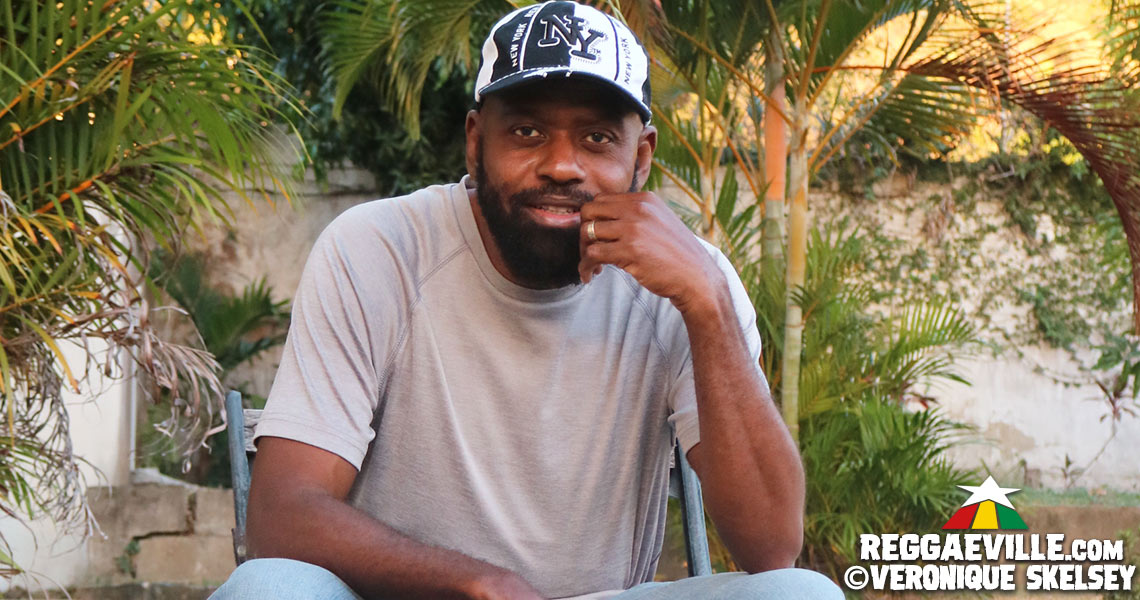
And not only have you received spiritual comfort from doing that but you've also continued to have a very successful career.
Yeah. Even more so than before! I’ve performed at major festivals all over Europe and the world.
You've received an honorary doctorate from Cornerstone Christian University in Orlando, Florida.
Yes, yes. In 2012, based on the collective body of work that I have done, the university did research and saw that it was fitting that I be honoured with an honorary PhD and doctorate. That was conferred on me by them. I've also written my book.
The Power Of Determination, published in 2014.
And I'm the first dancehall artist who have written a book. Books have been written about them and people have written books for them but none has really sat down to write lines upon lines, stanzas upon stanzas, paragraphs upon paragraphs, chapters upon chapters. The book is entitled The Power Of Determination, which is my autobiography. That's the first phase of it because the canvas is still being painted as we speak. And it is available on all digital download platforms and people can access it from my website as well.
Because I believe that my story is best written by me. The colour that I want to write it in, I think I'm the best person to be able to describe it in such a way because I have the ability to cause you to visually see what I write. You're not only reading about or imagining it but it's like a movie. The colour and the description it makes it very vivid.
Do you think that if you've been born in a different place or if your family was wealthy you might have been a poet or a Hollywood actor or screenwriter or a stand-up comedian? Could you see a different path in an alternate reality?
No. I believe the everything happened with me in the right way. I am a product of the ghetto and I also have a doctorate in ghetto-ology! (laughs) Because to be able to survive and function to reach the level where I am and manoeuvre through those sorts of challenges you have to be very skilful. And I am proud. I wouldn't want it any other way because I am the sum total of the experiences I've had and I wouldn't want any other experience in any other way. So I am quite comfortable, as I tell you in my skin, and it is a plus in terms of the preparation for who I am today. The ghetto.
And poverty really is not an excuse to be a failure. Poverty can be a prerequisite for success. It's just a matter of perspective that you choose to look at it from. Some people choose to look at the glass half empty or half full. They call one a pessimist and one an optimist but I believe they are both wrong. The glass is full it's just that they choose to look at one set of particles. They look at the water and not the air but the glass is full with water and air. That's how I choose to look at it.
I saw you perform in Halfway Tree during reggae month two years ago. This year I saw a video of you performing at the Lloyd Parks’ 44th anniversary which is a nice link back to what you were saying about Dennis Brown at the beginning. Your style still sounds contemporary in the 21st century dancehall landscape. It fits in with today. People don't enjoy your performances through nostalgia alone.
Thank you, thank you. Respect for that. Because we put in our all in whatever it is we do. I always try my best to be not relevant to the time but to be revolutionary to the time. I've always been a trendsetter, not a follower in terms of what I do. I push. I don't limit my creativity and my ability. I don't allow myself to be dictated by people's idea of what they think. I'm not swayed by that. It's their right to think so but just because they think it, doesn't necessarily mean that it is right.
Lots of people have talked about your lyrics and your storytelling ability, your humour. But a friend of mine who is a drummer said that what he really rates about your style is how rhythmical it is. That it's almost like you have a drum set in your head.
(laughs) Yes! Great to hear that because when I write my thing there are several things that I hear in my head, where I try to articulate, demonstrate in terms of the melodies that come forth on a different pattern that is pulsating and captivating, forcing you to move. Regardless of the tempo you must be able to feel that kind of a rhythm coming with the lyrics that punches you to move.
It's propulsive.
Yes, you know what I mean.
So finally let's talk about your new album Masterclass. It’s on French-based label X-ray Production. It features Agent Sasco who is also known for his lyrics and his style is fierce but he is intelligent and moral, so there is some parallel.
Yeah and he said that I am his early mentor. I remember him saying at his launch that he has been following me from when he was 5 years old! So that was good to hear. And because of his way of delivering, when we did the song together it was very easy for us to work together in terms of the lyrical flow.
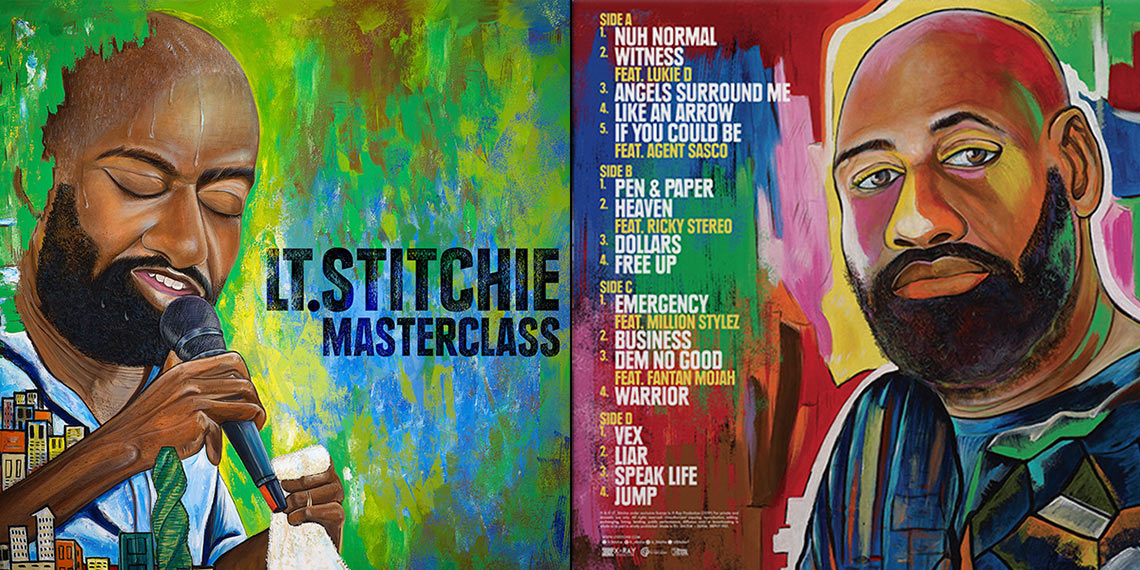
Lukie D is on the album as well – he is a humorous person.
It was myself who ended up giving Lukie D his first number one song - Don't Deny Me, the song that we did together. And we have always been seamless in terms of how we write together and we make melodies together in the recordings that we do. And this recording was done even over the phone! That's how much we gel. Because we started the flow over the phone. I was in France and he was in Jamaica and so I reached out to him and it was just like 1, 2, 3. Witness - that's the name of the song.
There’s also Ricky Stereo who is my old sparring partner from Stereo One and he is very dear to me. And he paused his album to be here with me to do that song with me. Million Stylez is from Sweden, and he is a very talented individual. Very kind hearted and easy to work with and he rates Stitchie too. He respects the Governor. And it was an honour for him to be a part of it. And the other person was Fantan Mojah. Fantan Mojah has his own style and delivery and his own way of presenting the stuff. So overall, I'm very proud of this project here. Masterclass, 17 tracks. Manudigital is a genius. Manu did most of the tracks.
Who are the other producers?
Craig McDonald, he was the one who did Fast And Pray [in 2004] so he did Nuh Normal, and we have Pascal Barro who did Like An Arrow and Jump, and Jerry from Irie Ites, he did Free Up and Mistah P. Marchal, he did Warrior. It’s like a reggae French connection! But that's how it turns out to be…
There are tunes like Nuh Normal which will appeal who just enjoy dancehall music, but as you say there's nothing lewd in there. Then you have songs like Angels Surround Me that are more spiritual. It represents your beliefs but without being preachy.
Yeah, we just bring it as real as it is but I am not on a religious crusade. I am on a pathway to open people's minds to a life of peace and love on a platform of righteousness. I mean: “love each other, love your brother as you love yourself” and if you have a different view to that then you are entitled to it.
If you noticed the album cover my eyes are closed and that is not without reason. We did it with an artist, Andy Ballantine and the reason for the eyes being closed was for this very reason that you asked me the question - because the message is colour blind. It's for all ethnicities. Music is not biased to any one individual or spiritual belief. It’s just music and the message is for everyone across the board. Regardless of your spiritual persuasion. Whatever you embrace. The message is for all. And if you look at the garden when we took the pictures earlier on it was blooming with different colours and it looked beautiful. That's how the album is. Eyes closed, looking in at people in that light. So we're seeing the beauty of every race, every individual.
The album is the colour green, blue and brown representing the earth. The blue for the sea and the greenery is the vegetation and the brown is the earth. And we are looking at a green environment, a green globe so whatever it is that we speak from the mouth to the microphone in hand it must bring life. That is why the greenery represents the prosperity and represents the life and the purity. So that's just what we speak: life with the hands going through the cities, it's saying that we are touring, sharing the word globally through each and every nook and cranny, each and every building, every home, every individual. That's the message that we preach: peace, love and righteousness.
READ THE FIRST PART OF THE INTERVIEW HERE!




